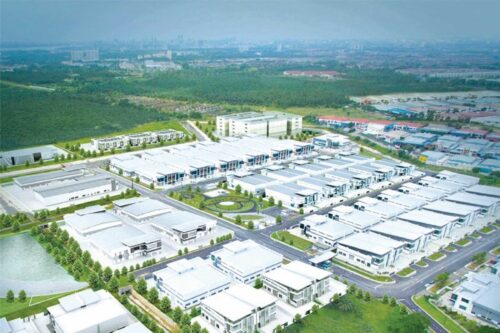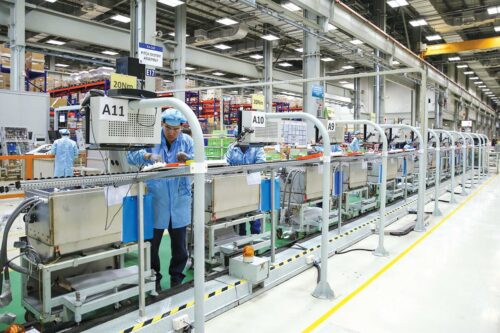The article by Mr. Dinh Hong Ky was published in the “Viewpoint” section of the online newspaper VnExpress.net on October 15, 2018.
I recently came across a company with a unique product in the city of Bologna, Italy. They have developed a software application for designing and manufacturing construction materials, built on artificial intelligence and big data platforms. Users can access a global database of tile products from various manufacturers and apply them to their own custom designs. For the first time, this application enables an ordinary person to perform the work of a professional designer.
I greatly admired the company and asked in-depth questions about the development of this remarkable application.
They told me it had been built and upgraded over many years alongside the advancement of information technology. Excitedly, I mentioned concepts like the Fourth Industrial Revolution (Industry 4.0), big data, artificial intelligence (AI), the Internet of Things (IoT), cloud computing, and digitalization—only to be surprised when they said they weren’t familiar with these trendy terms. They had simply been doing what they always had, year after year.
As an exporter with experience selling goods to various countries, I regularly interact with businesspeople from around the world. What astonished me was that when we used the term “Industry 4.0,” companies in the U.S., U.K., France, and Italy had no idea what we were talking about. When I explained it in terms of “opportunities and challenges,” they replied that they weren’t particularly concerned about “the Fourth Industrial Revolution.” Information technology has been evolving continuously over the past 20 years, and as it develops, they simply apply the new tools to their businesses.
In Vietnam, I hear the phrase “four point oh” almost every single day. Over the past year, from the government to local departments and enterprises, everywhere people are talking about Industry 4.0. Before one of my flights, I read on my phone about a beauty pageant where contestants were asked about Industry 4.0. As soon as the plane landed and I checked my phone again, there was an email from the Bình Thạnh District Party Committee inviting businesses to a seminar with the theme: “Industry 4.0: Opportunities and Challenges.”
Various sectors of society have enthusiastically jumped on board to embrace Industry 4.0, believing it to be a widespread global phenomenon. But in my view, what we really need is action—real action.
Action means creating a good environment and offering practical support for businesses and startups so they can survive, rather than being forced to give up. Many Vietnamese startups have chosen to base themselves in Singapore instead of their home country. Singapore has cultivated an especially business-friendly environment with practical policies around taxation and administrative procedures. Its central bank, the Monetary Authority of Singapore (MAS), has allocated hundreds of millions of U.S. dollars to support tech and fintech projects. Not just Singapore, but many Southeast Asian countries around Vietnam have implemented specific action plans to help businesses leverage technology. Meanwhile, in Vietnam, it’s hard to find concrete government support programs.
On another note, the excessive hype around “Industry 4.0” has led some to treat it like a magical force. At a recent Microsoft-organized conference, I witnessed a company representative boldly declare that they would implement digital transformation with the slogan “Change or die.” As someone who also runs a business, I believe digitalization is beneficial, but it doesn’t guarantee success. A company’s primary mission is to survive fierce market competition, generate profit, and ensure its employees’ livelihood. To undergo digital transformation, a business needs a solid foundation of professional operations, a highly skilled workforce, and competitive products already in the market.
Ask yourself: out of hundreds of thousands of Vietnamese companies struggling to stay afloat, how many can truly transform into “dragons” through digitalization? Overhyping and making sweeping declarations about a “revolution” can backfire, sowing confusion and instability within the business community. Small companies with limited budgets may feel pressured by the “change or die” rhetoric, ending up spending excessively on digital systems and applications that aren’t even appropriate for their stage of development.
We shouldn’t overdramatize any so-called revolution. Life never stands still, but it also doesn’t turn upside down overnight. Just a few years ago, owning a mobile phone was a luxury for most Vietnamese people. Today, even street vendors use smartphones for their work—without ever announcing they were part of some numbered revolution.
Recently, there have been many conferences and seminars on e-government, smart cities, and modern urban development. I don’t know whether a revolution is truly underway, but I do know that Tesla’s self-driving cars won’t be able to function properly on the chronically congested and frequently flooded roads of Ho Chi Minh City. And computer engineers may hesitate to come work in Vietnam simply due to concerns about food safety. No “x-point-zero” revolution in education will suddenly stop children in remote mountain regions from having to swim across rivers to get to school, or immediately ensure that each cancer patient in Ho Chi Minh City’s oncology hospital can have their own bed instead of sharing with two others.
Improving the quality of life for all citizens, in a fair and consistent way, should be the core goal for policymakers. If we can define our development goals clearly, then attaching a trendy “point-oh” label to them becomes unnecessary.
Dinh Hong Ky


